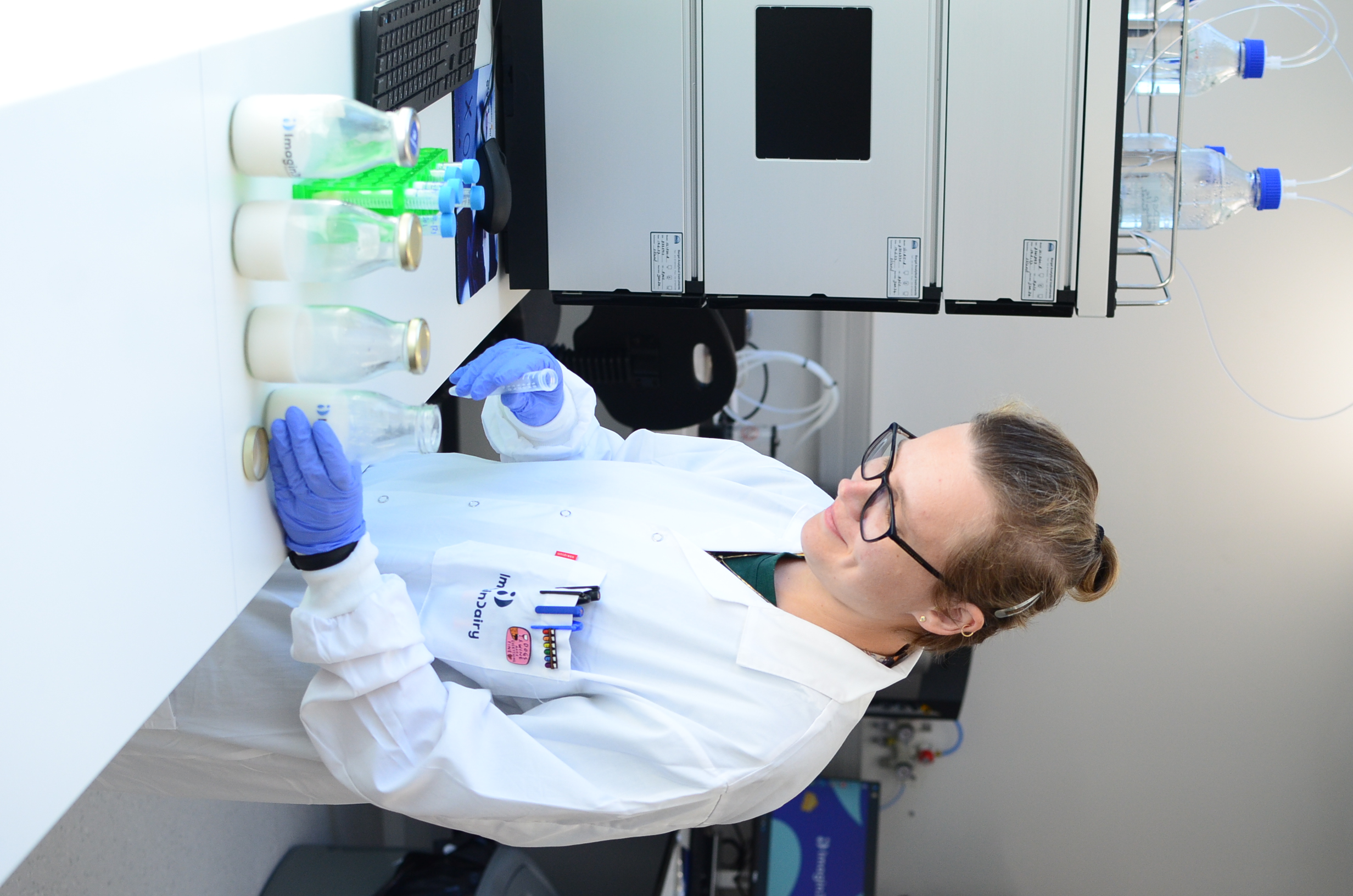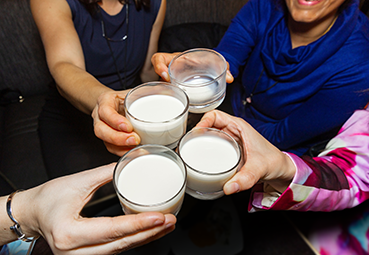

Deep Dive: Don't have a cow, man!
Louise Davis explores how the rapid pace of innovation in the alt dairy sector is translating to new ingredients, products (heck, even new categories), and more sustainable, delicious options for consumers than ever before
It’s a good time to be working in the alternative dairy industry. Not only is the market growing at an impressive pace but leaps in technology are also enabling food companies to answer that demand with a new breed of products that are truly competitive in matching the taste, performance, and texture of traditional dairy products. Labeling and naming issues are gradually being tackled – the popularity of vegan options such as almond milk and oat milk is paving the way for consumers to embrace the fact that something can be called a milk even if it has never been near a cow. And where plant-based milks were pioneers, the new generation of products – which spans everything from lab-grown dairy proteins to cream made from sunflower seeds – is also delivering on the environmental and sustainability front. Not to mention the advances on the ingredients side that are tackling the ever-rising consumer demand for allergy-friendly options.
Despite the positive news, there are some challenges remaining. As with almost everything we report on in these pages – where efforts often involve the move from a lab to a factory – scaling up production can prove difficult. And that’s for those companies lucky enough to even get that far; the investment landscape for new players is brutal right now. Nevertheless, this remains a fast-moving sector, and there are a bunch of brilliant innovators – a few of which we grill here – tackling those challenges and ensuring that their solutions rise to the top.

The whey forward
As with many parts of the alternative proteins industry, collaboration can prove to be crucial in fostering progress – something that Eyal Afergan, CEO & Co-Founder of Imagindairy, can testify to. In March 2024, his firm announced that it had won a grant in partnership with Ginkgo Bioworks to develop animal-free, non-whey dairy proteins. Afergan explains that this partnership enables Imagindairy to have a dual focus: “Our focus is on whey, and more specifically, Beta-lactoglobulin (BLG), which has received FDA GRAS No Questions Letter and that we are now scaling up and commercializing through our own production lines. The new partnership will allow us to accelerate the R&D and scaleup of non-whey proteins and to extend our product offering without defocusing.”
This ‘two-for-one’ setup reflects Afergan’s belief that both whey and non-whey proteins have excellent commercial potential. “Having both will allow us to address the full
range of dairy products,” he notes.
Similar to an increasing number of players, Imagindairy is going down the precision fermentation route – so, taking a well-established process and adopting it for new applications. Afergan points out that precision fermentation is already used in dairy for products such as chymosin (rennet enzyme for cheese curdling) and human milk oligosaccharides (HMO) for infant nutrition. “Therefore, we believe the barrier for implementing precision fermentation for dairy protein production is much lower versus other technologies under development such as cell-cultured dairy and plant molecular farming,” he says. “Specifically, our process is based on food-grade ingredients, without solvents or harmful substances. We use the fungi Aspergillus Orayze (also known as Koji mold), which is part of food systems today. Moreover, our advanced AI-based technology allows us to improve the yield of our ‘micro-cows’, giving us the optimal setup to deliver premium quality proteins at affordable prices.”
Although Afergan makes this huge and rapid progress sound easy, he does acknowledge that making the move to commercial-scale output is tricky. “It is always a challenging process, but we’ve managed to complete it successfully and at a much faster timeline than expected,” he reveals. “In addition, our acquisition of dedicated production lines has allowed us to both streamline the scaleup process and to ensure we have adequate capacity for protein commercialization.”
Achieving the necessary volumes of product is one thing, but what about the issue of price parity? “We are well on track to reach price parity and to support our customers as they offer animal-free dairy products on-shelf at competitive prices to traditional dairy,” Afergan declares. “One of our key differentiators that has allowed us to optimize the development of sustainable, animal-free dairy proteins is the integration of our proprietary AI platform into the precision fermentation process. It has been shown to increase the protein yield, supporting a more efficient supply, and helping us reach cost parity. Our facility allows us to incorporate optimized processes across the value chain to further cut costs, which will allow us to support mass-market adoption and will speed up the development of other milk proteins.”
Dairy queen
Another pioneer in leveraging precision fermentation to produce milk proteins is Fengru Lin, Founder & CEO of TurtleTree. “Precision fermentation allows us to create a biologically active, high-value functional animal protein completely free from the animal, which supports our mission to nourish people, planet, and animals in a sustainable way,” she begins.

So, how is TurtleTree’s approach different to other alt dairy players such as the abovementioned Imagindairy and the likes of Israeli firm Remilk? “The process is very similar to those in the industry such as Remilk, which is generating fermentation-derived whey or casein proteins,” notes Lin. “The differences lie in how each company chooses to establish safety and technical effect, or function, of our proteins. Some players establish safety through animal toxicology studies or use animal models to investigate function. TurtleTree has established a testing program that circumvents the need for animal testing and thus allows us to certify our product as vegan and our process as animal-free.”
Indeed, it is that securing vegan certification for its lactoferrin product, LF+, that truly sets TurtleTree apart from others in the market. “We proactively decided that achieving vegan certification for our first product was key to our mission and focus,” Lin comments. “This was a resource-intensive choice to help customers better understand that our lactoferrin is animal-free and can provide the same benefits such as iron regulation, immune function, and gut health as traditional dairy lactoferrin.”
Lin reports that TurtleTree had a great working relationship with Vegan Action, the third-party accreditation organization for vegan certification. “They were intrigued at the proposal for a fermentation-derived animal protein being certified vegan and took genuine interest in investigating the claim,” she says. “We shared details of our safety and functional testing plans and were very transparent about our process. In fact, at one point we paused our application process due to a technical challenge and the organization chased us! This was a great experience overall and one that we hope others in the alt protein industry choose to pursue.”
Our testing program circumvents the need for animal testing and thus allows us to certify our product as vegan and our process as animal-free
Lin also explains that vegan certification allows TurtleTree to provide its high-value functional ingredient to untouched markets such as vegan women’s health, vegan supplements and vegan sports nutrition. “Interestingly, we have some customers interested in exploring adding this iron-rich protein to plant-based meat to add the unique iron flavor customarily associated with animal meat,” she adds.

The company is undoubtedly on a roll in terms of applications of its technology. LF+ received Self-GRAS in November 2023 and the company will be submitting
its complete dossier for review shortly. Lin says that the response so far has been extremely positive. “Since this Self-GRAS achievement, we recently announced our first commercialization partnership with Cadence Performance Coffee, which will be including our LF+ in an espresso shot that will be marketed and utilized by endurance athletes as a part of their training regimens for triathlons, marathons and more. Lactoferrin and coffee have a symbiotic relationship; caffeine is known to reduce zinc and iron absorption from the diet, and LF+ can combat this effect and ensure access to dietary micronutrients to assist with iron regulation, immune function, and gut health.”
Lin also has her sights set elsewhere, further revealing that TurtleTree has a pipeline of other high-value, biologically active dairy proteins under development, all targeted at helping its customers improve the functionality of their B2C beverages and food products. “Additionally, we aim to target the infant nutrition sector globally with our fermentation-derived lactoferrin and are working on both technical and regulatory goals to reach this milestone,” she adds.
Biomass effect
Somebody else who is grappling with technical and regulatory goals in alternative dairy is Lucie Rein, CCO of the Swiss company, Cultivated Biosciences, which is currently scaling up the production of its biomass-fermentation produced cream. But Rein says that for her, the biggest challenge is not on the technical side. “It is the ‘chicken and egg’ problem of financing our scaleup to deliver for customers, and the need of customer commitments to find the financing,” she feels, reflecting a situation found at great numbers of alternative proteins startups right now. For Cultivated Biosciences, March 2024 saw a leap of progress on this front, with the announcement that it had closed a US$5 million seed funding round.
Our microstructure provides very complex and highly sought-for functionalities that bridge the gap between dairy-free and dairy
Technical progress could also prove to be rapid: as the company’s cream aims for functional parity rather than molecular replication of traditional dairy cream, it may well find a quicker path to market than other solutions. Describing the product, Rein says, “We produce a unique blend of fats, proteins and fibers, all derived from the same yeast biomass, and forming a homogenous natural emulsion. Our microstructure provides very complex and highly sought-after functionalities that bridge the gap between dairy-free and dairy.”

When it comes to determining ‘creaminess’, Rein adds, “It is primarily assessed through sensory evaluation, a nuanced sensation influenced chiefly by viscosity and lubrication. Our cream performs like dairy cream on viscosity and lubrication. Other sensory aspects, such as taste and color, also play crucial roles in the overall perception of creaminess, making it a multifaceted attribute of our product.”
That’s texture covered, but what does it taste like? “Our cream exhibits a neutral aroma with floury notes that, when incorporated into various formulations, does not alter the taste profile of the final product,” responds Rein. “This subtlety ensures versatility across a wide range of applications without compromising on taste.”
Indeed, Rein reports great interest in the product from the food and beverage manufacturing industry. “We are currently scaling up the production to deliver enough samples to meet demand. One recent project here was a proof of concept for our coffee creamer, which we did in collaboration with industry players. This demonstrated the creamer to be stable in coffee, provide a creamy mouthfeel, and a neutral taste – all within a clean formulation.”
Cream of the crop
Dimitris Karefyllakis is another person who is heavily invested in the mouthfeel of alternative dairy products – notably his own Oleocream product, which is produced using only sunflower seeds and water. And like Cultivated Biosciences, Karefyllakis’s excellently named company, Time-travelling Milkman, has also recently received an important financial injection, receiving €850,000 (US$927,000) in funding in April 2024.
Karefyllakis, Co-Founder & CEO, explains that this latest funding was designed to cover three key objectives. “Firstly, to convert us from production-ready to supplier-ready. Our upscaling path is not finished but we have achieved important milestones when it comes to production. We can currently produce up to 1,000 tons/year and these funds can help us cover our raw material and production costs and help us set reliable logistical frameworks of distribution of our Oleocream to our current and future customers.
“Secondly: sales, sales, sales! A big chunk of these funds will be used to expand our traction as much as possible by refining our approach, material and communications so that a clear message arrives to the right receivers. And, last but not least, team expansion to make the above two points possible. We have already hired an operations manager and are in the process of hiring sales manager,” he reveals.

For Karefyllakis, whose business plan is to sell Oleocream as an ingredient to food companies, the timing of this funding enables him to surf the wave of a trend he has an unwavering faith in. “The time has come for the second generation of plant-based dairy products,” he states. “We know it, the manufacturers know it, and more importantly, the consumers know it. There is only so much the sector can achieve with starch and coconut oil. Creaminess solutions that prioritize indulgence and nutrition will become a priority.”
He also notes that newer solutions such as his – and indeed the others profiled in this article – have learned a lot from those that tread this path before them. “The first generation of plant-based dairy products needed to simply exist, and were serving a small initial demand. That’s why they were launched with almost zero requirements when it came to nutrition, health and taste,” Karefyllakis says. “Whether jam-packed with saturated fats brought from the tropics or with myriad additives that nobody had heard of before, turning these products around and checking the ingredients list scared nutritionists and consumers alike. What they did not read on the label was protein and vitamins, that I can assure you!
“It became clear that these products needed to tidy up their composition and improve their Nutri-Score,” Karefyllakis continues. “Initially, we did not prioritize the naturalness of our Oleocream as the key selling point but, lately, potential customers begin conversations with questions about how Oleocream can help their products clean their label. Well, we were already producing it with only sunflower seeds and water, so we won’t change that any time soon – especially with the ultra-processed food scare in full swing in the European and North American markets,” he adds.
Karefyllakis is proud of already achieving commercial-scale production and says that although the 1,000 tons/year figure is not excessively large scale, “It definitely makes us noticeable by medium and large clients who are eying our ingredient for long-term and widespread use.
“When it comes to pricing, the reactions we are getting are positive but further upscaling will certainly be necessary for further price reductions and profit maximization,” Karefyllakis says. “We have validated and re-validated that at the industrial scale of 10,000 tons/year, we will be able to offer Oleocream at prices lower than that of dairy cream, the creaminess solution we aspire to replace. You can imagine that when this becomes possible, not only a big part of plant-based dairy but also of hybrid dairy products of the future will contain our future-proof and affordable creaminess solutions.”
Karefyllakis is bursting to disclose forthcoming announcements on the end-product side – he hints that breakfast spreads, sauces and soups are ‘the next frontiers’ – but NDAs prohibit him from shouting too loudly about specific customers. Instead, “we suggest that this summer you opt for plant-based ice cream to provide comfort from the heat. Then you may or may not feel a surprisingly pleasant mouth-feel coming from our Oleocream,” he says with a smile.
If you have any questions or would like to get in touch with us, please email info@futureofproteinproduction.com
More Features

Feeding change

Protein Pioneer: Kesha Stickland








